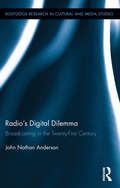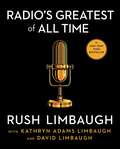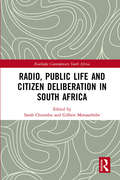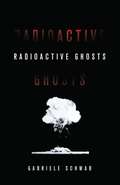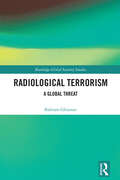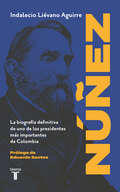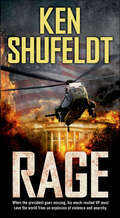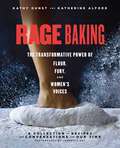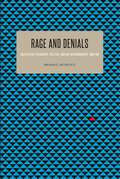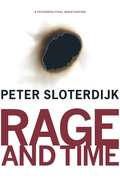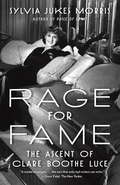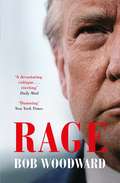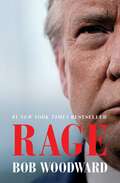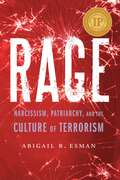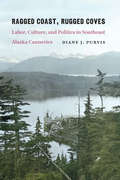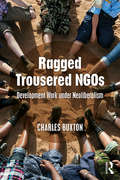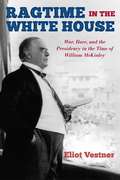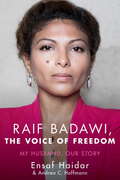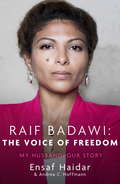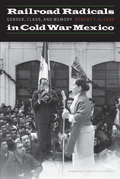- Table View
- List View
Radio and the Gendered Soundscape
by Christine EhrickThis book is a history of women, radio, and the gendered constructions of voice and sound in Buenos Aires, Argentina, and Montevideo, Uruguay. Through the stories of five women and one radio station, this study makes a substantial theoretical contribution to the study of gender, mass media, and political culture and expands our knowledge of these issues beyond the US and Western Europe. Included here is a study of the first all-women's radio station in the Western Hemisphere, an Argentine comedian known as 'Chaplin in Skirts', an author of titillating dramatic serials and, of course, Argentine First Lady 'Evita' Perón. Through the concept of the gendered soundscape, this study integrates sound studies and gender history in new ways, asking readers to consider both the female voice in history and the sonic dimensions of gender.
Radio and the Politics of Sound in Interwar France, 1921–1939
by Rebecca P. ScalesIn December 1921, France broadcast its first public radio program from a transmitter on the Eiffel Tower. In the decade that followed, radio evolved into a mass media capable of reaching millions. Crowds flocked to loudspeakers on city streets to listen to propaganda, children clustered around classroom radios, and families tuned in from their living rooms. Radio and the Politics of Sound in Interwar France, 1921–1939 examines the impact of this auditory culture on French society and politics, revealing how broadcasting became a new platform for political engagement, transforming the act of listening into an important, if highly contested, practice of citizenship. Rejecting models of broadcasting as the weapon of totalitarian regimes or a tool for forging democracy from above, the book offers a more nuanced picture of the politics of radio by uncovering competing interpretations of listening and diverse uses of broadcast sound that flourished between the world wars.
Radio in Revolution: Wireless Technology and State Power in Mexico, 1897–1938 (The Mexican Experience)
by J. Justin CastroLong before the Arab Spring and its use of social media demonstrated the potent intersection between technology and revolution, the Mexican Revolution employed wireless technology in the form of radiotelegraphy and radio broadcasting to alter the course of the revolution and influence how political leaders reconstituted the government.Radio in Revolution, an innovative study of early radio technologies and the Mexican Revolution, examines the foundational relationship between electronic wireless technologies, single-party rule, and authoritarian practices in Mexican media. J. Justin Castro bridges the Porfiriato and the Mexican Revolution, discussing the technological continuities and change that set the stage for Lázaro Cárdenas’s famous radio decree calling for the expropriation of foreign oil companies. Not only did the nascent development of radio technology represent a major component in government plans for nation and state building, its interplay with state power in Mexico also transformed it into a crucial component of public communication services, national cohesion, military operations, and intelligence gathering. Castro argues that the revolution had far-reaching ramifications for the development of radio and politics in Mexico and reveals how continued security concerns prompted the revolutionary victors to view radio as a threat even while they embraced it as an essential component of maintaining control.
Radio's Digital Dilemma: Broadcasting in the Twenty-First Century (Routledge Research in Cultural and Media Studies #60)
by John Nathan AndersonRadio's Digital Dilemma is the first comprehensive analysis of the United States’ digital radio transition, chronicling the technological and policy development of the HD Radio broadcast standard. A story laced with anxiety, ignorance, and hubris, the evolution of HD Radio pitted the nation’s largest commercial and public broadcasters against the rest of the radio industry and the listening public in a pitched battle over defining the digital future of the medium. The Federal Communications Commission has elected to put its faith in "marketplace forces" to govern radio’s digital transition, but this has not been a winning strategy: a dozen years from its rollout, the state of HD Radio is one of dangerous malaise, especially as newer digital audio distribution technologies fundamentally redefine the public identity of "radio" itself. Ultimately, Radio’s Digital Dilemma is a cautionary tale about the overarching influence of economics on contemporary media policymaking, to the detriment of notions such as public ownership and access to the airwaves—and a call for media scholars and reformers to engage in the continuing struggle of radio’s digital transition in hopes of reclaiming these important principles.
Radio's Greatest of All Time
by Rush Limbaugh#1 NEW YORK TIMES BESTSELLER A collection of Rush Limbaugh&’s greatest on-air moments, with special commentary and personal stories from his beloved widow, Kathryn Limbaugh, and brother, David Limbaugh.For more than thirty years, millions of listeners tuned in to hear Rush Limbaugh&’s voice. At its peak, The Rush Limbaugh Show aired on more than 650 radio stations nationwide, and his inimitable commentary and distinctive sense of humor garnered a devoted audience that celebrated with him when he received the Presidential Medal of Freedom in 2020. Rush&’s passing the following year sent shock waves through the conservative and broadcasting communities. In this timeless collection of his best work, his triumphant legacy as the greatest voice for conservatism is cemented in history. When Rush&’s dear friend Vince Flynn first suggested the idea of this book, Rush considered the task daunting. &“How can I possibly select the best of the best,&” he joked, &“from all the years of pure genius?&” Over time, Rush came to love this project immensely, and recalled incredible details from his childhood and early career. Featuring commentary from loved ones, family, friends, and prominent figures such as President Donald Trump, Supreme Court Justice Clarence Thomas, Governor Ron DeSantis, and more, Radio&’s Greatest of All Time is the ultimate gift for any devoted listener and leaves no doubt about his profound impact on this country.
Radio, Public Life and Citizen Deliberation in South Africa (Routledge Contemporary South Africa)
by Sarah ChiumbuThis book critically analyses the important role of radio in public life in post-apartheid South Africa. As the most widespread and popular form of communication in the country, radio occupies an essential space in the deliberation and the construction of public opinion in South Africa. From just a few state-controlled stations during the apartheid era, there are now more than 100 radio stations, reaching vast swathes of the population and providing an important space for citizens to air their views and take part in significant socio-economic and political issues of the country. The various contributors to this book demonstrate that whilst print and television media often serve elite interests and audiences, the low cost and flexibility of radio has helped it to create a ‘common’ space for national dialogue and deliberation. The book also investigates the ways in which digital technologies have enhanced the consumption of radio and produced a sense of imagined community for citizens, including those in marginalised communities and rural areas. This book will be of interest to researchers with an interest in media, politics and culture in South Africa specifically, as well as those with an interest in broadcast media more generally.
Radioactive Ghosts (Posthumanities #61)
by Gabriele SchwabA pioneering examination of nuclear trauma, the continuing and new nuclear peril, and the subjectivities they generate Amid resurgent calls for widespread nuclear energy and &“limited nuclear war,&” the populations that must live with the consequences of these decisions are increasingly insecure. The nuclear peril combined with the looming threat of climate change means that we are seeing the formation of a new kind of subjectivity: humans who are in a position of perpetual ontological insecurity. In Radioactive Ghosts, Gabriele Schwab articulates a vision of these &“nuclear subjectivities&” that we all live with. Focusing on the legacies of the Manhattan Project, Hiroshima, and nuclear energy politics, Radioactive Ghosts takes us on a tour of the little-seen sides of our nuclear world. Examining devastating uranium mining on Native lands, nuclear sacrifice zones, the catastrophic accidents at Chernobyl and Fukushima, and the formation of a new transspecies ethics, Schwab shows how individuals threatened with extinction are creating new adaptations, defenses, and communal spaces. Ranging from personal accounts of experiences with radiation to in-depth readings of literature, film, art, and scholarly works, Schwab gives us a complex, idiosyncratic, and personal analysis of one of the most overlooked issues of our time.
Radiological Terrorism: A Global Threat (Routledge Global Security Studies)
by Bahram GhiasseeThis book addresses radiological terrorism and the significant threats it poses to the public, the economy, and the environment across the globe.The work assesses the global radiological security issues associated with the illicit acquisition of radioactive substances by non-State actors, in particular terrorist groups, for malicious purposes. The book also examines the risks posed by ‘sealed radioactive sources’ used extensively in medical and industrial applications worldwide, which may be used in acts of terrorism and in illicit transnational trafficking. Moreover, the book provides an assessment of the international legal and institutional frameworks governing radiological security and radiological counter-terrorism. It highlights the inherent deficiencies and inadequacies that the international community needs to address, with a view to effectively counter the evolving and emerging radiological terrorism threats worldwide. Furthermore, the book discusses the transnational nature of radiological terrorism and the need for multilateral cooperation to counter the global radiological threats and effectively mitigate the risks posed to the public, the economy, and ecological systems.This book will be of interest to students of terrorism studies, security studies, nuclear non-proliferation, science and technology studies, and International Relations.
Radovan Karadžić
by Robert J. DoniaRadovan Karadžić, leader of the Bosnian Serb nationalists during the Bosnian War (1992–5), stands accused of genocide and other crimes of war before the International Criminal Tribunal for the former Yugoslavia in The Hague. This book traces the origins of the extreme violence of the war to the utopian national aspirations of the Serb Democratic Party and Karadžić's personal transformation from an unremarkable family man to the powerful leader of the Bosnian Serb nationalists. Based on previously unused documents from the tribunal's archives and many hours of Karadžić's cross-examination at his trial, the author shows why and how the Bosnian Serb leader planned and directed the worst atrocities in Europe since the Second World War. This book provocatively argues that postcommunist democracy was a primary enabler of mass atrocities because it provided the means to mobilize large numbers of Bosnian Serbs for the campaign to eliminate non-Serbs from conquered land.
Rafael Núñez: La biografía definitiva de uno de los presidentes más importantes de colombia
by Indalecio Liévano AguirreLa biografía más completa del presidente Rafael Núñez "Muchas veces se ha querido juzgar al poeta con criterio meramente retórico, cuando la verdad es que en Núñez el poeta, el hombre privado y el hombre público están indisolublemente ligados .Así lo comprendió Liévano Aguirre y ese, para mí, es el mejor acierto literario y psicológico de su obra. Con certero instinto vio dónde estaba la mejor clave de interpretación de la personalidad del doctor Núñez y nos presenta en su biografía una figura profundamente humana, alimentada siempre por fuertes e implacables pasiones, por un cálido sentido de la vida, por rencores, venganzas, ambiciones y sensualidades que ejercían influjo decisivo sobre lo que pudiera considerarse como mera orientación política. La fría enumeración de las actividades públicas de Núñez y de la manera como ellas modificaron la vida colombiana no podría jamás explicarnos por sí sola la personalidad del padre de la Regeneración. Se equivocan, a mi modo de ver, quienes quisieran ver en él tan solo a un doctrinario, a un pensador político, a un organizador de las instituciones. Podría ser todo eso pero era además una pasión en marcha, una pasión humana, influida decisivamente por todas las cosas grandes y pequeñas que afectan la vida de los hombres". Eduardo Santos
Rage
by Ken ShufeldtKen Shufeldt thrills again with Rage. When the GOP realizes they'll never regain the White House without the minority vote, they select Victor Garcia, a Hispanic Marine War Hero, as the Vice Presidential candidate for Peter Montblanc's run at the Presidency. Montblanc wins the election, but in a shocking turn of events just a few weeks after his election into office, he disappears. The GOP elites' worst fears are realized when Victor Garcia is named Acting President. From big money contributors, dirty politicians, a secretive billionaire, and duplicitous Iranian leaders, everyone seems hell-bent on plunging the world into chaos. Faced with a seemingly endless string of attacks and disasters, President Garcia soon learns that his greatest enemy might be closer than he thinks.At the Publisher's request, this title is being sold without Digital Rights Management Software (DRM) applied.
Rage Baking: The Transformative Power of Flour, Fury, and Women's Voices
by Kathy Gunst Katherine Alford50+ recipes, short essays, and quotes from some of the best bakers, activists, and outspoken women in our country today—this cookbook encourages women to use sugar and sass as a way to defend, resist, and protest. Since the 2016 election, many women across the country have felt rage, fury, and frustration, wondering how we got here. Some act by calling their senators, some write checks, some join activist groups, march, paint signs, grab their daughters and sons, and raise their voices. But for so many, they also turn to their greatest comfort—their kitchen. Baking has a new meaning in today&’s world. These days, baking can be an outlet for expressing our feelings about the current state of our society. Rage Baking offers more than 50 cookie, cake, tart, and pie recipes as well as inspirational essays, reflections, and interviews with well known bakers and impassioned women and activists including Dorie Greenspan, Ruth Reichl, Carla Hall, Preeti Mistry, Julia Turshen, Pati Jinich, Vallery Lomas, Von Diaz, Genevieve Ko, and writers like Rebecca Traister, Pam Houston, Tess Raffery, Cecile Richards, Ann Friedman, Marti Noxon, and many more. Timely, fun, and creative, this cookbook speaks to both skilled and beginner bakers who are looking for new ways to use their sweetest skills to combine food and activism. Containing a collection of recipes that are satisfying and delicious, Rage Baking unites like-minded women who are passionate about baking and change.
Rage and Denials: Collectivist Philosophy, Politics, and Art Historiography, 1890–1947
by Branko MitrovićIn Rage and Denials, philosopher and architectural historian Branko Mitrović examines in detail the historiography of art and architecture in the twentieth century, with a focus on the debate between the understanding of society as a set of individuals and the understanding of individuals as mere manifestations of the collectives to which they belong. The conflict between these two views constitutes a core methodological problem of the philosophy of history and was intensely debated by twentieth-century art historians—one of the few art-historical debates with a wide range of implications for the entire field of the humanities. Mitrović presents the most significant positions and arguments in this dispute as they were articulated in the art- and architectural-historical discourse as well as in the wider context of the historiography and philosophy of history of the era. He explores the philosophical content of scholarship engaged in these debates, examining the authors’ positions, the intricacies and implications of their arguments, and the rise and dominance of collectivist art historiography after the 1890s. He centers his study on the key art-historical figures Erwin Panofsky, Ernst Gombrich, and Hans Sedlmayr while drawing attention to the writings of the less well known Vasiliy Pavlovich Zubov. Rage and Denials offers a valuable window onto how key aspects of modern research in the humanities took shape over the course of the twentieth century.
Rage and Time: A Psychopolitical Investigation (Insurrections: Critical Studies in Religion, Politics, and Culture)
by Peter SloterdijkWhile ancient civilizations worshipped strong, active emotions, modern societies have favored more peaceful attitudes, especially within the democratic process. We have largely forgotten the struggle to make use of thymos, the part of the soul that, following Plato, contains spirit, pride, and indignation. Rather, Christianity and psychoanalysis have promoted mutual understanding to overcome conflict. Through unique examples, Peter Sloterdijk, the preeminent posthumanist, argues exactly the opposite, showing how the history of Western civilization can be read as a suppression and return of rage. By way of reinterpreting the Iliad, Alexandre Dumas's Count of Monte Cristo, and recent Islamic political riots in Paris, Sloterdijk proves the fallacy that rage is an emotion capable of control. Global terrorism and economic frustrations have rendered strong emotions visibly resurgent, and the consequences of violent outbursts will determine international relations for decades to come. To better respond to rage and its complexity, Sloterdijk daringly breaks with entrenched dogma and contructs a new theory for confronting conflict. His approach acknowledges and respects the proper place of rage and channels it into productive political struggle.
Rage for Fame
by Sylvia MorrisDetailed and rich with mesmerizing narrative, Rage for Fame recounts the story of the flowering years of Clare Booth Luce--a former congresswoman and editor of Vanity Fair--a striking woman whose private life was as intriguing and spectacular as her public life. 45 photos.From the Hardcover edition.
Rage: Fear, Rage, And Peril
by Bob WoodwardBOB WOODWARD&’S NEW BOOK, RAGE, IS AN UNPRECEDENTED AND INTIMATE TOUR DE FORCE OF NEW REPORTING ON THE TRUMP PRESIDENCY FACING A GLOBAL PANDEMIC, ECONOMIC DISASTER AND RACIAL UNREST. Woodward, the No 1 international bestselling author of Fear: Trump in the White House, has uncovered the precise moment the president was warned that the Covid-19 epidemic would be the biggest national security threat to his presidency. In dramatic detail, Woodward takes readers into the Oval Office as Trump&’s head pops up when he is told in January 2020 that the pandemic could reach the scale of the 1918 Spanish Flu that killed 675,000 Americans. In 17 on-the-record interviews with Woodward over seven volatile months - an utterly vivid window into Trump&’s mind - the president provides a self-portrait that is part denial and part combative interchange mixed with surprising moments of doubt as he glimpses the perils in the presidency and what he calls the 'dynamite behind every door'. At key decision points, Rage shows how Trump&’s responses to the crises of 2020 were rooted in the instincts, habits and style he developed during his first three years as president. Revisiting the earliest days of the Trump presidency, Rage reveals how Secretary of Defense James Mattis, Secretary of State Rex Tillerson and Director of National Intelligence Dan Coats struggled to keep the country safe as the president dismantled any semblance of collegial national security decision making. Rage draws from hundreds of hours of interviews with first-hand witnesses as well as participants&’ notes, emails, diaries, calendars and confidential documents. Woodward obtained 25 never-seen personal letters exchanged between Trump and North Korean leader Kim Jong Un, who describes the bond between the two leaders as out of a 'fantasy film'. Trump insists to Woodward he will triumph over Covid-19 and the economic calamity. 'Don&’t worry about it, Bob. Okay?' Trump told the author in July. 'Don&’t worry about it. We&’ll get to do another book. You&’ll find I was right.'
Rage: Fear, Rage, And Peril
by Bob WoodwardRage is an unprecedented and intimate tour de force of new reporting on the Trump presidency facing a global pandemic, economic disaster and racial unrest.Woodward, the #1 international bestselling author of Fear: Trump in the White House, has uncovered the precise moment the president was warned that the Covid-19 epidemic would be the biggest national security threat to his presidency. In dramatic detail, Woodward takes readers into the Oval Office as Trump&’s head pops up when he is told in January 2020 that the pandemic could reach the scale of the 1918 Spanish Flu that killed 675,000 Americans. In 17 on-the-record interviews with Woodward over seven volatile months—an utterly vivid window into Trump&’s mind—the president provides a self-portrait that is part denial and part combative interchange mixed with surprising moments of doubt as he glimpses the perils in the presidency and what he calls the &“dynamite behind every door.&” At key decision points, Rage shows how Trump&’s responses to the crises of 2020 were rooted in the instincts, habits and style he developed during his first three years as president. Revisiting the earliest days of the Trump presidency, Rage reveals how Secretary of Defense James Mattis, Secretary of State Rex Tillerson and Director of National Intelligence Dan Coats struggled to keep the country safe as the president dismantled any semblance of collegial national security decision making. Rage draws from hundreds of hours of interviews with firsthand witnesses as well as participants&’ notes, emails, diaries, calendars and confidential documents. Woodward obtained 25 never-seen personal letters exchanged between Trump and North Korean leader Kim Jong Un, who describes the bond between the two leaders as out of a &“fantasy film.&” Trump insists to Woodward he will triumph over Covid-19 and the economic calamity. &“Don&’t worry about it, Bob. Okay?&” Trump told the author in July. &“Don&’t worry about it. We&’ll get to do another book. You&’ll find I was right.&”
Rage: Narcissism, Patriarchy, and the Culture of Terrorism
by Abigail R. EsmanIn the days after 9/11, Abigail R. Esman walked the streets of New York haunted by a feeling that was eerily familiar: the trauma of violence that hovered in the air. Friends, family, and strangers moved, walked, even stood as she herself had done earlier as a victim of domestic battery and abuse. Since then, Esman, a journalist who specializes in writing on terrorism and radicalization, has studied the connections between domestic abuse and terrorism and the forces that inspire both forms of violence. In Rage: Narcissism, Patriarchy, and the Culture of Terrorism Esman brings into focus the complex web that ties them together, illuminating the terrorist psyche and the cultures that create it. With this new approach to understanding terrorism and violence, Esman presents clear explanations of pathological narcissism and its roots in shame-honor cultures—both familial and sociopolitical—through portraits of terrorists and batterers, including O. J. Simpson, Osama bin Laden, Anders Breivik, and Dylann Roof. The insights of psychiatrists, former white supremacists, Islamist terrorists, national security experts, and others elaborate her thesis, while Esman&’s own experiences with abuse and the aftermath of 9/11 on the streets of New York City further enrich the narrative. At a time when so many lives are threatened by public violence and terrorism, understanding the forces that incite them has become crucial, and finding solutions, urgent. Esman proposes social and policy initiatives aimed at reducing violence while engendering social equality and enriching women&’s rights. Such proposals, she argues, are essential to overcoming the cultural and political forces that hinder progress toward security and peace. This groundbreaking book sheds new light on the roots of violence and terrorism while advancing proactive measures to protect our values and traditions of justice, equality, and freedom.
Ragged Coast, Rugged Coves: Labor, Culture, and Politics in Southeast Alaska Canneries
by Diane J. PurvisRagged Coast, Rugged Coves explores the untold story of cannery workers in Southeast Alaska from 1878, when the first cannery was erected on the Alexander Archipelago, through the Cold War. The cannery jobs brought waves of immigrants, starting with Chinese, followed by Japanese, and then Filipino nationals. Working alongside these men were Alaska Native women, trained from childhood in processing salmon. Because of their expertise, these women remained the mainstay of employment in these fish factories for decades while their husbands or brothers fished, often for the same company. Canned salmon was territorial Alaska&’s most important industry. The tax revenue, though meager, kept the local government running, and as corporate wealth grew, it did not take long for a mix of socioeconomic factors and politics to affect every aspect of the lands, waters, and population. During this time the workers formed a bond and shared their experiences, troubles, and joys. Alaska Natives and Chinese, Japanese, and Filipino immigrants brought elements from their ethnic heritage into the mix, creating a cannery culture. Although the labor was difficult and frequently unsafe, the cannery workers and fishermen were not victims. When they saw injustice, they acted on the threat. In the process, the Tlingits and Haidas, clans of Southeast Alaska for more than ten thousand years, aligned their interests with Filipino activists and the union movement. Ragged Coast, Rugged Coves tells the powerful story of diverse peoples uniting to triumph over adversity.
Ragged Trousered NGOs: Development Work under Neoliberalism
by Charles BuxtonRagged Trousered NGOs is a compelling first-hand account of the NGO sector and wider civil society over the past 40 years, examining how and why people take collective action and engage in social development projects. The book explores different organisational and methodological aspects of NGO work and social action, asking what was possible to achieve at a grass-roots level at different times, in different economic and political contexts in the East and West. Adopting a critical perspective, the author argues that social action continues to play a vital and varied role, and yet it struggles to challenge deep-rooted power relations and traditional forms of behaviour in today's unequal world. In particular, the book draws on examples from the former Soviet Union in transition, and the UK's voluntary sector over the last 40 years, with a view to challenging Eurocentric views about organisations and communities. The analysis adopts a Gramscian view of hegemony and an internationalist and anti-war position on key issues arising in recent armed conflicts and the new cold war with Russia. The book concludes by addressing the challenges for development workers, noting the precarious nature of NGO work despite its many achievements, and suggesting ways in which social activists can pick up more strength and support. This book's practical perspective on progressive forms of organisational management will be of considerable interest to civil society and NGO development workers, as well as to researchers and students in the fields of international development, politics, sociology and regional studies.
Ragtime in the White House: War, Race, and the Presidency in the Time of William McKinley
by Eliot VestnerHistory played a trick on McKinley. He has been consigned to the shadows between Lincoln and Theodore Roosevelt, vilified or ignored by historians . . . It is a richly undeserved fate.As Eliot Vestner demonstrates in this narrative of the political life of William McKinley, there was much more to the twenty-fifth president&’s tenure in office than history books allow. He was a popular president, winning a second term with ease. But only nine months into it, he was assassinated by a self-described anarchist. What more he might have accomplished is anyone&’s guess. He had managed to successfully pull America out of one of the worst economic depressions yet experienced, the Panic of 1893. And his controversial tariffs strengthened industry and contributed to the overall wealth of the country, as did his return of the country to the gold standard. He also led the U.S. to victory in the Spanish-American war, and implemented the first steps toward building the Panama Canal, which his successor, Theodore Roosevelt, continued. Perhaps the most under-appreciated aspect of McKinley&’s presidency was his advocacy for black civil rights, and his challenge to the white supremacy of the south. As governor of Ohio, he fought against lynching. He signed a ground-breaking anti-lynching bill. Ironically, as president, he had a much more difficult time combating violence and racial injustice because of the use of states&’ rights as justification for voter suppression and terrorism towards blacks. He pursued opportunities to advance the interests of black Americans wherever he could, but his inability to stop the lynchings and disfranchisement of blacks was most regrettable. His successors had no interest in the race issue, which remained unresolved until the 1954 court decision in Brown v. The Board of Education. This book gives McKinley his due, and thereby helps us better understand a President of the United States whose work has seemingly been overlooked by most Americans today.
Raif Badawi, The Voice of Freedom: My Husband, Our Story
by Ensaf Haidar Andrea Claudia HoffmannA powerful first-person account of Ensaf Haidar's life wither her husband, Saudi Arabian social activist Raif Badawi, and her worldwide campaign to free him from imprisonment Ensaf Haidar's unforgettable account of her marriage to imprisoned Saudi blogger Raif Badawi tells the story of the survival of their love against all odds, and of her courageous fight for her husband's freedom.When Ensaf and Raif married in 2002 they shed tears of joy; they had overcome the resistance of her family and the rigid conventions of Saudi Arabian culture, and their battle to be together was finally won. But an even greater challenge lay ahead. After the romance of their clandestine courtship, the triumph of their wedding day, and the ups and downs of married life, Ensaf discovers that Raif is becoming active in the liberal movement. Their partnership grows stronger as Raif works tirelessly, daring to question the social order of Saudi Arabia -- until his activities attract the attention of the religious police. With Raif under increasing surveillance, Ensaf reluctantly accepts exile as the only way to protect their three young children, hoping that Raif will soon join them.But Raif's arrest and subsequent sentence -- to ten years in prison and 1,000 lashes -- change everything. Ensaf must take up the fight for her husband's life, galvanizing global support and campaigning for his freedom -- and their right to be reunited as a family again. This profoundly moving memoir is both a love story and an inspiring account of the making of not one but two heroic human rights activists.
Raif Badawi: My Husband, Our Story
by Ensaf Haidar Andrea C HoffmannThe whole world knows the face of the young man with the bright black eyes. He is in the process of becoming an icon, a symbol, similar to the famous photo of Che Guevara. The face is that of Raif Badawi, who was nominated for the 2015 Nobel Peace Prize. Arrested in Saudi Arabia, he was sentenced to ten years' imprisonment and 1000 lashes - a de facto death sentence.The woman who succeeded in getting such people as Barack Obama and Prince Charles to appeal personally to the Saudi King for Badawi's release is his wife, Ensaf Haidar, who began the campaign to free her husband with a self-painted poster in front of a small church in Sherbrooke, Canada.When Raif Badawi and Ensaf Haidar fell in love with each other as adolescents, they did so in violation of every moral precept in the strictly Islamic Kingdom of Saudi Arabia. During their clandestine love affair, the young couple had no idea that, more than a decade later, Ensaf's love for Raif would attract the attention of politicians from around the world as the blogger's wife now mobilises global public opinion in an effort to save her husband from murder at the hands of the Saudi judiciary. With a courage born of desperation, she is fighting from exile in Canada to secure the release of the father of her three children, and is bringing great pressure to bear on the murderous regime in her native country.Ensaf Haidar tells Raif's and her own story: the story of their shared liberal ideas and her fight for her husband's release.
Raif Badawi: My Husband, Our Story
by Ensaf Haidar Andrea C HoffmannThe whole world knows the face of the young man with the bright black eyes. He is in the process of becoming an icon, a symbol, similar to the famous photo of Che Guevara. The face is that of Raif Badawi, who was nominated for the 2015 Nobel Peace Prize. Arrested in Saudi Arabia, he was sentenced to ten years' imprisonment and 1000 lashes - a de facto death sentence.The woman who succeeded in getting such people as Barack Obama and Prince Charles to appeal personally to the Saudi King for Badawi's release is his wife, Ensaf Haidar, who began the campaign to free her husband with a self-painted poster in front of a small church in Sherbrooke, Canada.When Raif Badawi and Ensaf Haidar fell in love with each other as adolescents, they did so in violation of every moral precept in the strictly Islamic Kingdom of Saudi Arabia. During their clandestine love affair, the young couple had no idea that, more than a decade later, Ensaf's love for Raif would attract the attention of politicians from around the world as the blogger's wife now mobilises global public opinion in an effort to save her husband from murder at the hands of the Saudi judiciary. With a courage born of desperation, she is fighting from exile in Canada to secure the release of the father of her three children, and is bringing great pressure to bear on the murderous regime in her native country.Ensaf Haidar tells Raif's and her own story: the story of their shared liberal ideas and her fight for her husband's release.
Railroad Radicals in Cold War Mexico: Gender, Class, and Memory (The Mexican Experience)
by Robert F. AlegreDespite the Mexican government&’s projected image of prosperity and modernity in the years following World War II, workers who felt that Mexico&’s progress had come at their expense became increasingly discontented. From 1948 to 1958, unelected and often corrupt officials of STFRM, the railroad workers&’ union, collaborated with the ruling Institutionalized Revolutionary Party (PRI) to freeze wages for the rank and file. In response, members of STFRM staged a series of labor strikes in 1958 and 1959 that inspired a nationwide working-class movement. The Mexican army crushed the last strike on March 26, 1959, and union members discovered that in the context of the Cold War, exercising their constitutional right to organize and strike appeared radical, even subversive.Railroad Radicals in Cold War Mexico examines a pivotal moment in post–World War II Mexican history. The railroad movement reflected the contested process of postwar modernization, which began with workers demanding higher wages at the end of World War II and culminated in the railway strikes of the 1950s, a bold challenge to PRI rule. In addition, Robert F. Alegre gives the wives of the railroad workers a narrative place in this history by incorporating issues of gender identity in his analysis.


